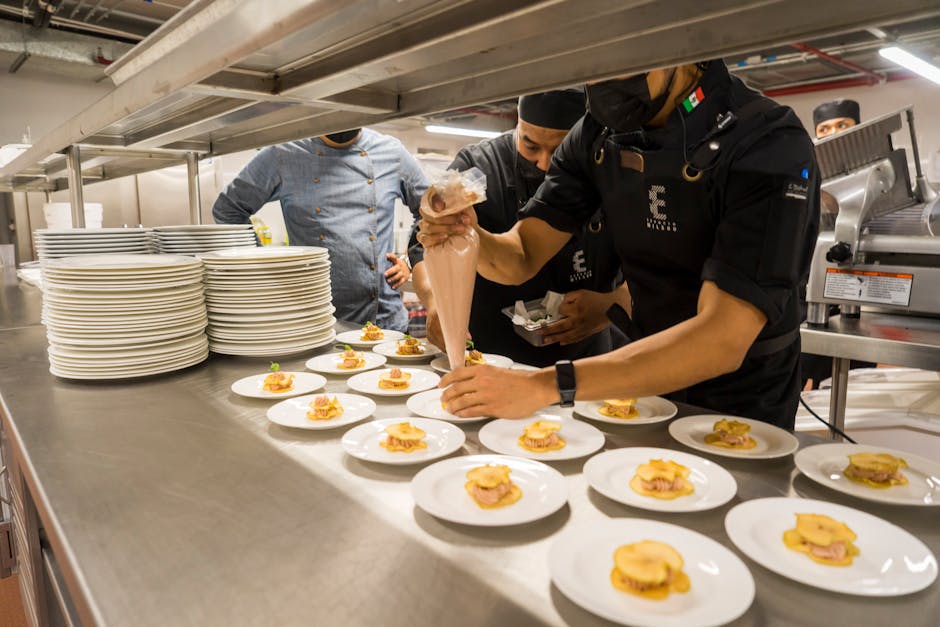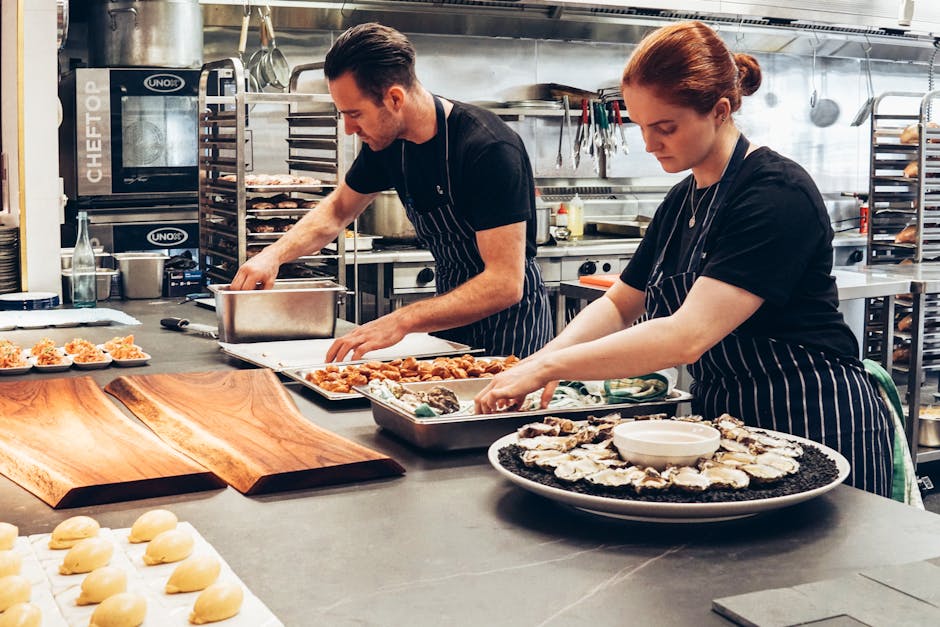Retaining Skilled Chefs in Saudi Catering
Understanding the Chef Retention Crisis in Saudi Arabia
The Saudi catering industry experiences chef turnover rates exceeding 25% annually. This disrupts operations and impacts service quality. Therefore, understanding why chefs leave is the first step toward retention. Common reasons include:
- Lack of career advancement opportunities
- Inadequate compensation and benefits packages
- Cultural and language barriers in the workplace
- Poor work-life balance and excessive hours
- Limited recognition for culinary achievements
Additionally, the rapid expansion of Saudi’s hospitality sector under Vision 2030 has increased demand for skilled chefs. This creates more opportunities for chefs to jump ship for better offers.
Competitive Compensation for Chefs in Saudi Arabia
Firstly, attractive remuneration remains the foundation of retaining skilled chefs. The Saudi market requires tailored compensation packages that address both financial and lifestyle needs.
Salary Benchmarks for Culinary Professionals
Executive chefs in Saudi Arabia typically earn between SAR 15,000-25,000 monthly. Sous chefs command SAR 8,000-12,000, while specialty chefs average SAR 6,000-10,000. However, these figures vary based on:
- Type of establishment (hotel, restaurant, corporate catering)
- Chef’s nationality and international experience
- Specialized culinary skills and certifications
- Location within Saudi Arabia
Furthermore, regular salary reviews ensure your compensation stays competitive. Annual increases of 5-10% help retain top performers.
Comprehensive Benefits Package
Beyond base salary, benefits significantly impact retention. Essential components include:
- Housing allowance or company-provided accommodation
- Transportation allowance or company transportation
- Annual return airfare to home country
- Comprehensive health insurance
- Performance-based bonuses and incentives
- End-of-service benefits as per Saudi labor law
Moreover, some catering companies offer education allowances for chefs’ children. This demonstrates commitment to their family wellbeing.
Career Development for Culinary Staff
Secondly, ambitious chefs seek growth opportunities. Consequently, structured career paths prevent stagnation and turnover.
Creating Clear Advancement Pathways
Establish transparent promotion criteria from commis to executive chef level. Define skill requirements and timeframes for each step. Additionally, create specialized tracks for pastry, dietary, and other niche areas.
Professional Development Opportunities
Invest in your chefs’ continuous learning through:
- Sponsored certifications from recognized institutions like The Culinary Institute of America
- Participation in international culinary competitions
- Cross-training across different kitchen stations
- Mentorship programs with senior culinary experts
Furthermore, support chefs in obtaining Saudi-specific certifications. This shows commitment to their long-term development in the Kingdom.
Work Culture and Environment in Saudi Kitchens
Thirdly, kitchen culture dramatically impacts retention. The unique aspects of Saudi catering operations require special attention to workplace dynamics.
Fostering Cross-Cultural Understanding
Saudi kitchens often feature diverse international teams. Bridge cultural gaps through:
- Cultural sensitivity training for all staff
- Basic Arabic language lessons for non-native speakers
- Team-building activities that celebrate diversity
- Clear communication protocols respecting cultural norms
Additionally, understand religious practices like prayer times and Ramadan considerations. Adapt schedules respectfully to support spiritual needs.
Improving Working Conditions
Kitchen environments significantly impact job satisfaction. Key improvements include:
- Modern, well-maintained equipment reducing physical strain
- Adequate staffing levels to prevent burnout
- Reasonable working hours with proper break periods
- Climate-controlled environments for Saudi’s extreme heat
Moreover, implement fair scheduling practices. Rotate undesirable shifts equally among team members.
Recognition and Motivation Strategies
Fourthly, chefs need appreciation beyond their paychecks. Consequently, recognition programs boost morale and loyalty.
Formal Recognition Programs
Implement structured systems to celebrate achievements:
- ‘Chef of the Month’ awards with meaningful rewards
- Performance bonuses for exceptional feedback or innovation
- Public recognition in company communications
- Opportunities to represent the company at events
Professional Autonomy and Creativity
Skilled chefs value creative expression. Therefore, provide opportunities for:
- Menu development input and special feature dishes
- Seasonal menu changes showcasing chef specialties
- Collaboration with other departments on food concepts
- Participation in supplier selection and quality assessment
Furthermore, support chefs in maintaining their culinary identity while adapting to local tastes.
Work-Life Balance for Catering Chefs
Fifthly, the demanding nature of catering requires special attention to work-life balance. This is particularly important for expatriate chefs far from home.
Reasonable Scheduling Practices
Implement fair scheduling considering:
- Maximum consecutive working days limits
- Adequate time off between shifts
- Rotating holiday coverage fairly among staff
- Flexible scheduling for personal needs when possible
Additionally, provide sufficient annual leave. Support chefs in taking full vacations to recharge.
Support Systems for Expatriate Chefs
Expat chefs face unique challenges in Saudi Arabia. Support them through:
- Assistance with housing and settlement services
- Orientation programs covering local customs and regulations
- Social events helping build community connections
- Mental health support and counseling services
Moreover, consider family support for married chefs with families abroad. Regular communication allowances help maintain important relationships.
Leveraging Technology for Chef Retention
Modern technology solutions can significantly improve chef retention in Saudi catering operations.
Kitchen Management Systems
Implement systems that streamline operations and reduce stress:
- Inventory management software minimizing waste tasks
- Recipe costing and standardization tools
- Scheduling software ensuring fair shift distribution
- Communication platforms facilitating team coordination
Additionally, invest in equipment that reduces physical strain. Modern combi-ovens, food processors, and ergonomic tools show commitment to staff wellbeing.
Digital Learning Platforms
Provide access to online culinary resources:
- Subscription-based training platforms like Ryman Healthcare
- Webinars from world-renowned chefs
- Digital recipe databases and inspiration sources
- Language learning applications for Arabic acquisition
Measuring and Improving Retention Efforts
Finally, effective retention requires continuous measurement and improvement. Track key metrics to assess your strategies.
Key Performance Indicators
Monitor these critical metrics:
- Overall chef turnover rate percentage
- Voluntary versus involuntary separation rates
- Average tenure by position and department
- Exit interview feedback trends
- Employee satisfaction survey results
Furthermore, conduct stay interviews with current chefs. proactively identify concerns before they lead to departure.
Continuous Improvement Process
Regularly assess and enhance your retention strategies:
- Benchmark against industry standards through resources like Saudi HR Society
- Stay updated on Saudi labor law changes affecting culinary staff
- Adapt strategies based on performance data and feedback
- Innovate based on emerging best practices in hospitality HR
Frequently Asked Questions
What are the biggest challenges in retaining chefs in Saudi Arabia?
The main challenges include cultural adaptation, intense competition for talent, work-life balance issues, and meeting compensation expectations. Many chefs struggle with being away from home and adapting to Saudi workplace culture.
How does Saudi labor law impact chef retention strategies?
Saudi labor law mandates specific benefits like end-of-service awards, vacation time, and working hour limitations. Understanding these requirements is essential for designing compliant retention packages that exceed minimum standards.
What benefits are most valued by chefs working in Saudi catering?
Beyond competitive salary, chefs value quality housing, annual home leave tickets, health insurance, performance bonuses, and professional development opportunities. Family-related benefits are particularly valued by married chefs.
How can catering companies improve work-life balance for chefs?
Implement fair scheduling practices, ensure adequate time off between shifts, provide comfortable accommodation near workplace, and support mental health through counseling services and social activities.
What role does cultural training play in retaining skilled chefs?
Cultural training is crucial for helping expatriate chefs adapt to Saudi customs and workplace norms. It reduces culture shock, improves team integration, and helps chefs feel more comfortable in their new environment.
How often should compensation be reviewed for culinary staff?
Annual reviews are standard, but more frequent reviews may be necessary during periods of high inflation or rapid market changes. Additionally, performance-based increases should be considered biannually for exceptional chefs.
Conclusion: Building a Culinary Destination Workplace
In conclusion, retaining skilled chefs in Saudi catering requires a comprehensive approach addressing compensation, culture, growth, and wellbeing. By implementing these strategies, you can transform your kitchen into a destination where culinary talent thrives. Remember that retention is an ongoing process requiring continuous attention and adaptation to market changes. Ultimately, investing in your chefs pays dividends through consistent quality, innovation, and operational stability. Ready to transform your culinary team retention? Contact our HR experts today for personalized strategies tailored to your Saudi catering operation.




